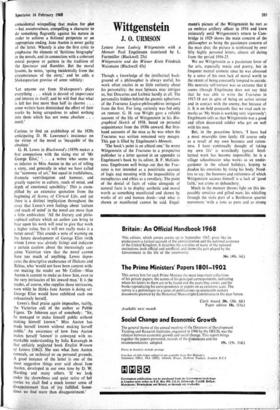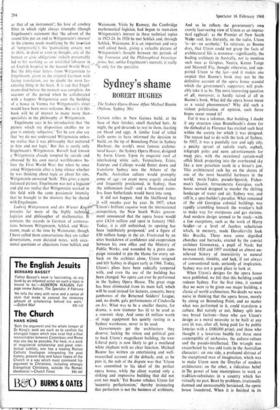Wittgenstein
J. 0. URMSON
Wittgenstein und der Wiener Kreis Friedrich Waismann (Blackwell 45s)
Though a knowledge of the intellectual back- ground of a philosopher is always useful, his work often excites in us little curiosity about his personality; the man Spinoza may intrigue us, but Descartes and Leibniz hardly at all. The personality hidden behind the gnomic aphorisms of the Tractatus Logico-philosophicus intrigued from the first. For long, curiosity was fed only on rumour. G. H. von Wright gave a reliable account of the life of Wittgenstein in his Bio- graphical Sketch of 1958, based on personal acquaintance from the 1930s onward. But first- hand accounts of the Man as he was when the Tractatus was written remained very meagre. This gap is filled by Engelmann's Memoir.
'The book's point is an ethical one.' So wrote Wittgenstein of the Tractatus to a prospective publisher in a letter quoted in an appendix to Engelmann's book by its editor, B. F. McGuin- ness. Engelmann well brings out that the Trac- tatus is not intended as a positivistic account of logic and meaning with the impossibility of metaphysics and ethics as a corollary. The point of the denial of facts of value alongside of natural facts is to display aesthetic and moral worth as something manifested and shown by works of art and human deeds—and what is shown or manifested cannot be said. Engel- mimes picture of the Wittgenstein he met as an embryo artillery officer in 1916 and knew
intimately until Wittgenstein's return to Cam- bridge in 1929 shows the main concern of the philosopher as being the passionate concern of the man also; the picture is reinforced by over fifty highly personal letters, almost all dating from the period 1916-25.
We see Wittgenstein as a passionate lover of the arts, especially music and poetry, but in frequent mental torment since he was obsessed by a sense of his own lack of moral worth to the extent of being constantly tempted to suicide. His neurotic self-torture was so extreme that it seems (though Engelmann does not say this) that he was able to write the Traciatus in 1917-18 not in spite of being on active service and in contact with the enemy, but because of it. It is on field postcards that we read such re- marks as 'My brain is working very vigorously'; Engelmann tells us that Wittgenstein was a good and often decorated soldier who got on well with his men.
But, in the peacetime letters, `I have had a most miserable time lately. Of course only as a result of my own baseness and rotten- ness. I have continually thought of taking my own life' is wretchedly typical. Intel- lectual work has become impossible; he is a village schoolmaster who works as an undel% gardener in the school holidays, hoping to deaden his emotions by tiring his body. Need- less to say, the baseness and rottenness of which Wittgenstein accuses himself is a lack of 'good faith,' not crime or debauchery.
Much in the memoir throws light on this im- possibly sensitive and gifted man; his whistling through the viola part of a Beethoven quartet movement 'with a tone as pure and as strong as that of an instrument'; his love of cowboy films in which right always triumphs (though Engelmann's statement that 'the advent of the sound film put an end to Wittgenstein's interest' in the cinema needs modifying by tile insortion of 'temporarily'); his 'painstaking anxiety not to shirk, in deed or even in thought, any of the human or civic obligations' (which presumably led to his working as an unskilled labourer in an English hospital in the Second World War). But the fifty-four letters from Wittgenstein to Engelmann, given in the original German with facing translation, are no doubt the most fas- cinating thing in the book. It is sad that Engel- mann died before the memoir was complete. An account of the period when he collaborated with a happier Wittgenstein over the building of a house in Vienna for Wittgenstein's sister would have been most welcome. But as it iS" this book will be of interest to many more than specialists in the philosophy of Wittgenstein.
Engelmann says in his introduction that 'the picture which my disposition enables me to give is entirely subjective.' Yet he can also say that 'we do not understand Wittgenstein unless we realise that it was philosophy that mattered to him and not !ogle.' But this is surely only Engelmann's Wittgenstein. Russell had known a Wittgenstein already tempted by suicide and obsessed by his own moral worthlessness be- fore the First World War; but when he once asked Wittgenstein after a long silence whether he was thinking about logic or about his sins, Wittgenstein answered 'both.' This gives a more balanced picture. Engelmann was not a logician and did not realise that Wittgenstein worked in this field with the same passionate intensity that he brought to the interests that he shared with Engelmann. , Ludwig Wittgenstein und der Wiener KrI
et presents far more of the highly technic logician and philosopher of mathematics. t contains the records in German of conversa- tions between Wittgenstein, Schlick and Wais- mann, made at the time by Waismann; though I have called them conversations they are rather dissertations, even dictated notes, with occa- sional questions or objections from Schlick and
Waismann. Visits by Ramsey, the Cambridge mathematical logician, had begun to reawaken Wittgenstein's interest in these technical topics
. in 1923-24. In 1.926 he met Schlick and, through Schlick, Waismann. It is an important and very well edited book, giving a valuable picture of
. Wittgenstein's thought between the periods of the Tractatus and the Philosophical Investiga- ,, 1ions; but, unlike Engelmann's memoir, it really is only for the specialist.



































 Previous page
Previous page